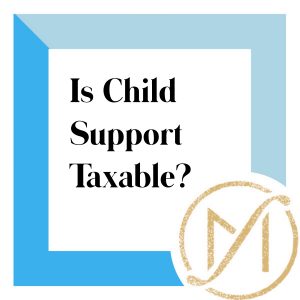Divorce has a tremendous impact on your finances for years to come — and taxes can significantly impact those finances. Let’s take some time to review a fundamental divorce and taxes topic: child support.
Read on to learn more.
Child Support & Taxes
We will answer the two biggest questions in divorce, child support, and your taxes:
- Can I deduct child support payments from my taxes?
- Do I have to pay taxes on child support?
The key thing to know about child support is that it doesn’t impact either parent’s taxes. In other words, the parent who pays child support does not receive a tax deduction. And, the parent who received child support does not pay taxes on that child support.
It follows, then, that . . .
Can I Deduct Child Support?
No. Child support is “tax neutral.” You cannot deduct child support payments you make from your taxable income.
Read: Divorce, Child Support, & Taxes Read: Tax Basics for Divorce
Do I Have To Pay Taxes on Child Support?
No. Child support isn’t taxable to either parent. The IRS doesn’t consider child support you receive as taxable income to you.
Read: Divorce, Retirement Accounts, & Taxes
How Does CT Calculate Child Support?
The Connecticut Child Support Guidelines use the parents’ combined net income, not the parents’ gross income.
Read: Divorce, Alimony, & Taxes
What is Gross Income for Calculating Child Support?
“Gross” essentially means “total.” Gross income includes salary, commissions, bonuses, pension, retirement, and trust income.
What is Net Income for Calculating Child Support?
For child support, Connecticut defines net income as “gross income minus allowable deductions.” That means that courts take a parent’s gross income and deduct federal taxes, state taxes, Social Security, etc., and mandatory expenses like medical insurance premiums and mandatory retirement contributions. That number is the parent’s “net income” for child support.
Calculating Child Support
Both parents’ weekly net incomes are combined, and the Connecticut Child Support Guidelines then calculate a percentage based on Connecticut’s income shares model, and how many children the parents have. Connecticut determine’s each parent’s support obligation by calculating the percentage each parent contributes to the combined net weekly income. The amount calculated for the custodial parent is retained by that parent and presumably used for the support and maintenance of the child. The amount calculated for the noncustodial parent becomes the presumed support order to be paid to the custodial parent.
Read: How Does Connecticut Calculate Child Support?
Am I Allowed to Claim a Tax Exemption for My Children Post-Divorce?
The general rule is that the custodial parent is entitled to the exemption for children.
But what about families with a shared parenting plan? Well, that’s when creative lawyering comes into play. Sometimes, one parent claims one child, and the other claims another. Sometimes, parents trade years. The value of the exemption for children varies significantly depending on income, so sometimes, the exemption is more valuable to one parent than to the other parent.
Read: Is There Child Support If We Have Shared Physical Custody?
Next Steps
As with all divorce issues, we need to know your goals when it comes to taxes. Once we understand what matters most to you, we design a legal strategy to move you toward it.
We designed our first step at Freed Marcroft, the Goals & Planning Conference, to get to the heart of your problem and unveil your true goals. Then, we take those goals along with the facts of your case and analyze them to present you with recommendations and options for moving forward.









